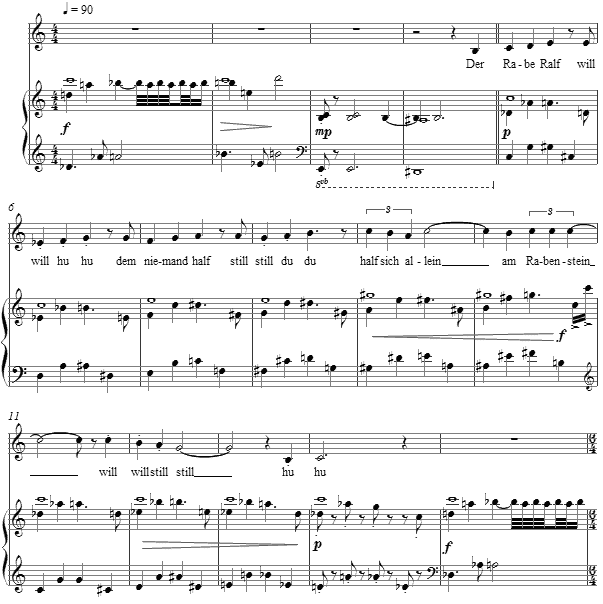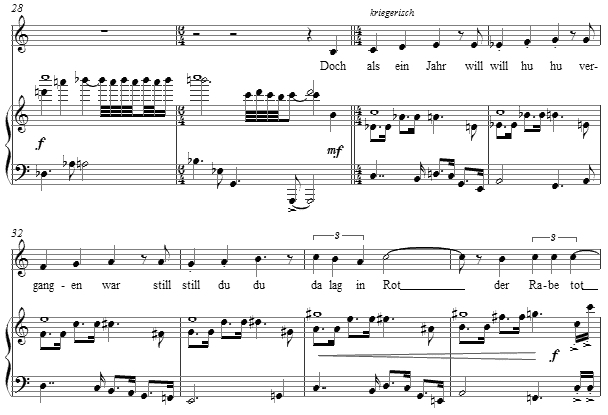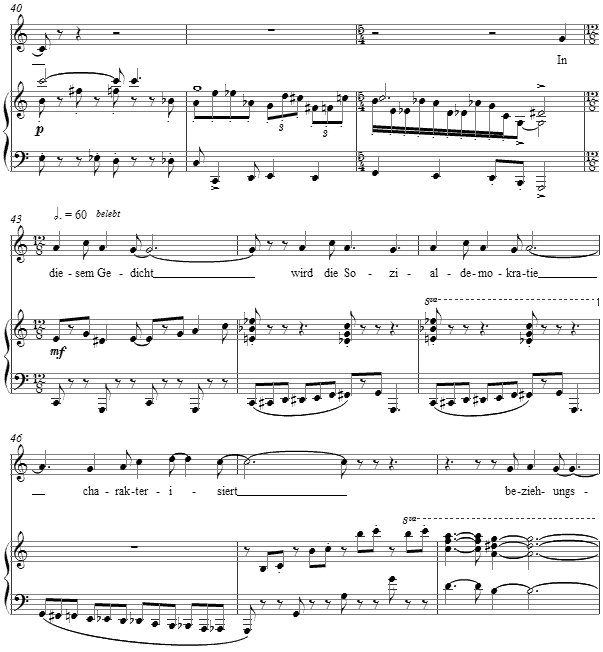Music and Texts of GARY BACHLUND
Vocal Music | Piano | Organ | Chamber Music | Orchestral | Articles and Commentary | Poems and Stories | Miscellany | FAQs
Der Rabe Ralf - (2009)
Christian Morgenstern
for medium or low voice and piano
Der Rabe Ralf
will will hu hu
dem niemand half
still still du du
half sich allein
am Rabenstein
will will still still
hu hu
Die Nebelfrau
will will hu hu
nimmt's nicht genau
still still du du
sie sagt nimm nimm
's ist nicht so schlimm
will will still still
hu hu
Doch als ein Jahr
will will hu hu
vergangen war
still still du du
da lag im Rot
der Rabe tot ,
will will still still
du du
In diesem Gedicht wird die Sozialdemokratie characterisiert
bzw. ihr Übergang von lasalleschen zu marxistischen Ideen.
[ 4 pages, circa 2' 45" ]
Christian Morgenstern
The Raven Ralf
The raven Ralf
wants and wants brr boo
no one helped
silent silent you you
helped himself
On Rabenstein
wants and wants silent silent
brr boo brr boo
The feminine haze
wants and wants brr boo
doesn't take exactly
silent silent you you
she says take take
it's not so bad
wants and wants silent silent
brr boo brr boo
But than after a year
wants and wants brr boo
was passed
silent silent you you
there lay in the Redness
the raven dead
wants and wants silent silent
you you
In this poem is social democracy characterized, such that it shows its change from adventuresome exploration [ 1 ] to Marxist ideas.
(paraphrase by the composer)
The last line which is in prose is not included in all the examples of this seeming nonsense poem drawn from the collection, Galgendichtung (1905), and yet it yields the sense behind the nonsense. It most assuredly explains what I translated simply as "Redness." Given the research by academics into the massive violence of the twentieth century, it comes down to a question of nationalism under the Kaiser and then National Socialism in Germany which Morgenstern prophecies, as well as the various violent collectivists from the Soviet to the other streams of genocide as practiced in all cases by a government of one sort or another.
In my morning walk this day, I noted a magpie attack on a smaller bird, predictable along the Darwinian understanding of science. A shopkeeper was highly angered and tried to keep the magpie from its "nature" though she managed nothing except her own upset over the violence of nature. Yet. she was willing to exert her own violence -- broom in hand -- on the magpie, in some unnatural act of "social justice." One creature dies, and so her social act is another creature's death? She was not meant to rule over nature, and her waging this small and ultimately ineffective yet willingly violent war was a small capsule of what whole nations have managed to do. For this Christian Morgenstern was prophetic and an astute observer of the natural world.
Ralf the raven was a character no one would help, so he helped himself; and he lived. When the notion of taking from others enters the story -- which Morgenstern characterizes as feminine, meaning less than manly -- this is the midpoint in Ralf's story. The end point is death, in any metaphoric interpretation one wishes to place over this sensible nonsense.
The general scheme of the alto and bass lines is one of half step dissonance against the long-lined soprano voice. This chromatic climbing pits itself against the vocal line, rooted in C. The three stanzas become increasingly sharper in interior rhythms as the setting unfolds.
The last stanza is marked as "martial" with its dotted rhythms, while the bass line sings out a variant of the Internationale. The dynamics rise to forte as the scene shows Ralf dead in the "Redness."
The commentary on this nonsense poem is set in a distinctly different "swing time" meter and appropriate tempo, flippantly perhaps because the lessons of governments' violent, repetitive misuse of power are so easily dismissed in favor of the happier thoughts -- which is called forgetting.
The score for Der Rabe Ralf is available as a free PDF download, though any major commercial performance or recording of the work is prohibited without prior arrangement with the composer. Click on the graphic below for this piano-vocal score.
NOTES
[ 1 ] Morgenstern employs an adjective form of a proper name, which one will likely not find in most German dictionaries. He writes of "lasalleschen" ideas, and these refer to Ferdinand Johann Gottlieb Lassalle (1825–64), a German-Jewish jurist, philosopher, and socialist political activist. His life's end was itself brutal, killed in a duel over a woman. Thus he represents for the purpose of this poem the manly adventurer, while Marx' death -- which occurred in his arm chair in a flat in London, after more than a decade of intellectual feebleness and seriously declining health -- represents the opposite.
In deed Marx' revolutionary activities were limited to writing tracts and addresses, and exchanging letters with others who would become the active "Marxists." These polar opposites are stark in many ways, but Morgenstern notes that simple Ralf, facing a difficult life of competition, might well have found the more inglorious death through "Redness" than through a simple life of struggles. History seems to have borne this lesson out in full.
For this please see, my setting of Rudolph Rummel's Pray tell, my brother, why and note Professor Rummel's seminal and detailed work on Freedom, Democracy, Peace; Power, Democide, and War.
By way of update in 2012, Gerd Büntzly wrote a short note to clarify about Lassalle, a correction and insight for which I am grateful. I find the history of democrat socialism most amusing for a number of reasons.
First as relates to Lassalle, while he was known to have been a committed republican in the sense of that era of a monarchy, Bismarck later was to say of his meetings with Lassalle that the jurist and activist was not a republican. Politics always seems intent of muddying waters, does it not?
The second comment I note is that in Marx' era, socialism was referred to as "scientific." Given the current debt-ridden state of affairs in many European nations which followed various forms of socialism, it seems that the science was not as proven as it was said to be. I am not a fan of political parties nor an adherent to the so-called Left-Right model of politics, for there are those who would theorize and die quietly in their arm chair, while others take on the risk for themselves.
One should also recall the slur Marx aimed at Lassalle: Jewish nigger.
As to those who bore the ultimate burden of political risks, Erich Mühsam is one who comes to mind. This is true in the arts, in which the comfortable world of acceptance is sought even by the now orthodox avant-garde.
Men like Søren Kierkegaard (1813-1855) were ardent critics of what they saw as idealist intellectuals, and almost two centuries later we seem to have many idealist intellectuals who have been wholly in charge of nations as massive debts were built up, not a very smart thing to do in retrospect.
Der Spiegel has only recently printed an expose of the Kohl administration in Germany in the run-up to the introduction of the Euro in which political considerations simply trumped significant economic data, as if wishing for something would make it so.
At the end of the economic day, these idealist intellectuals will have "contributed" to enormous social distress in the form of public debt burdens, the absolute inverse of their idealism's "social" aims.
Unless, that is and in the view of those like Kierkegaard, their first order of business was to assure themselves positions of leverage and power. For this, Frederic Bastiat's observation from the mid 19th century speaks volumes to today: "Government is the great fiction, through which everybody endeavors to live at the expense of everybody else."



